Comprehensive Analysis of Contract Law: Elements, Types, and Liability
VerifiedAdded on 2019/12/03
|16
|5708
|236
Report
AI Summary
This report provides a comprehensive overview of contract law, delving into its essential elements, various types of contracts, and the principles of liability. It begins by outlining the fundamental components required for the formation of a valid contract, including offer and acceptance, intention to create legal relations, consideration, capacity, and privity of contract. The report then explores different types of contracts, such as face-to-face, distance selling, and written contracts, along with verbal, deeds, inferred, online, business-to-business, and business-to-consumer contracts. Furthermore, it examines the different terms of a contract, including express, implied, innominate, and exclusion clauses. The report includes case explanations to illustrate these concepts. It also addresses the difference between contract and tort liability, the development of the concept of duty of care, and how businesses can be held vicariously liable. Finally, the report includes a short contract draft, a letter, and answers to scenario-based questions, demonstrating the practical application of contract law principles.
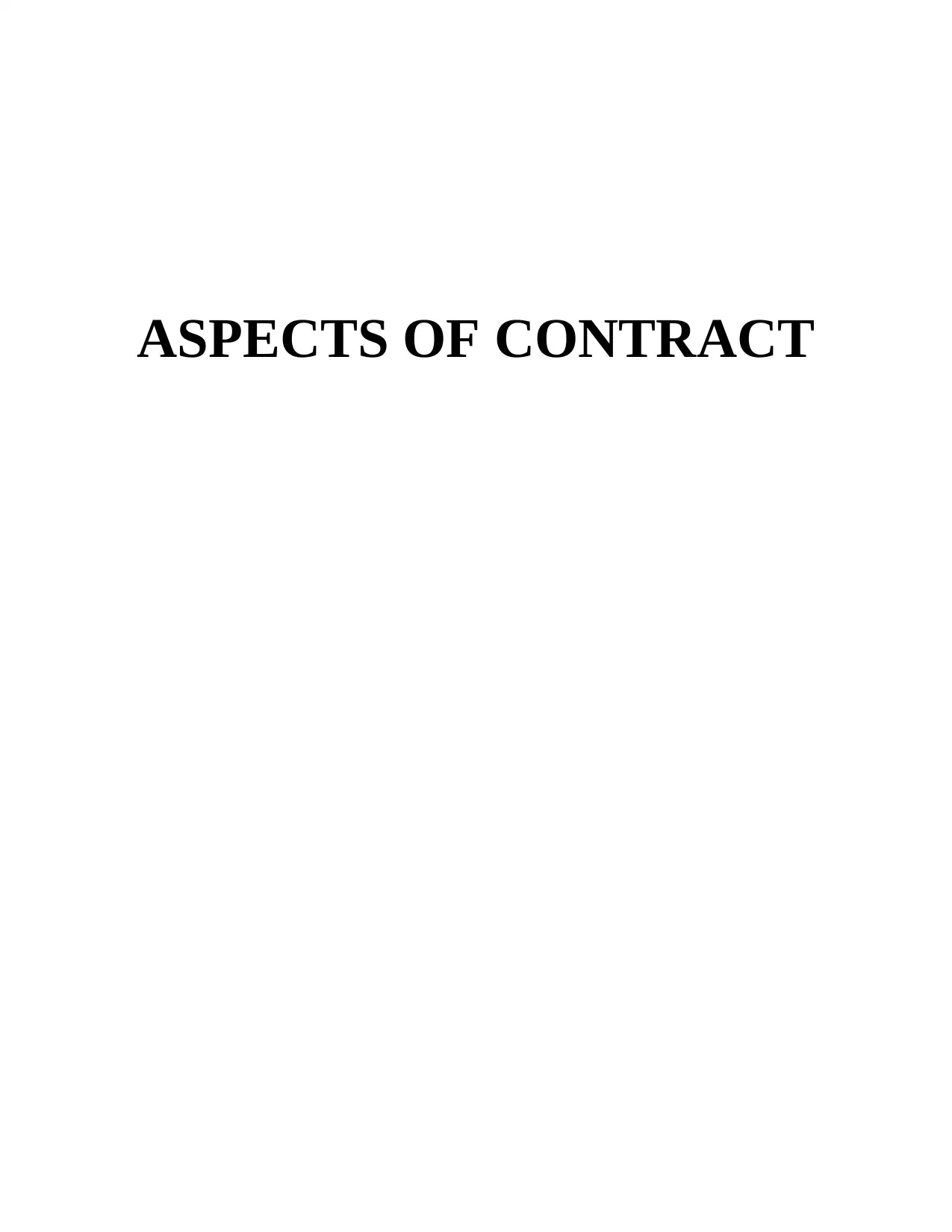
ASPECTS OF CONTRACT
Paraphrase This Document
Need a fresh take? Get an instant paraphrase of this document with our AI Paraphraser
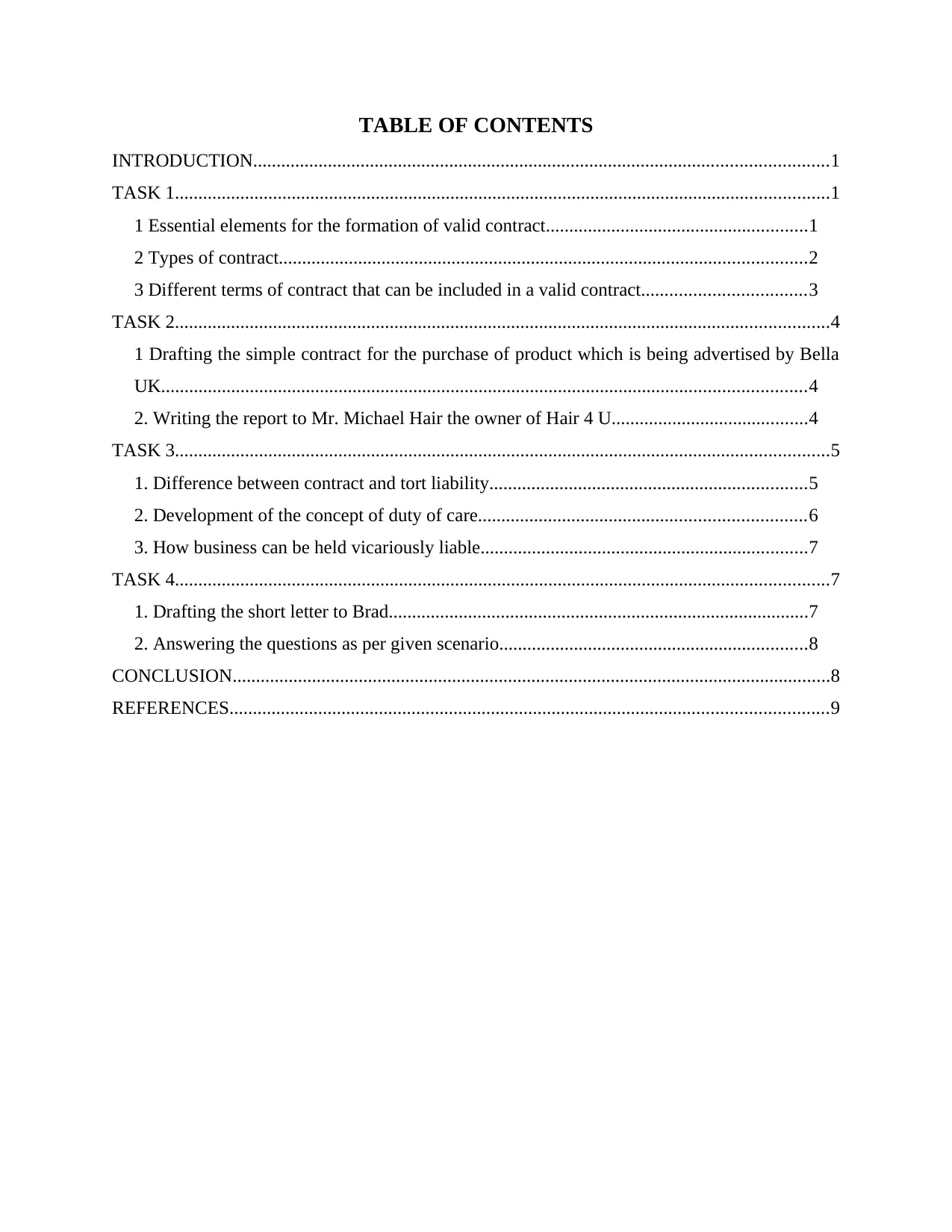
TABLE OF CONTENTS
INTRODUCTION...........................................................................................................................1
TASK 1............................................................................................................................................1
1 Essential elements for the formation of valid contract........................................................1
2 Types of contract.................................................................................................................2
3 Different terms of contract that can be included in a valid contract...................................3
TASK 2............................................................................................................................................4
1 Drafting the simple contract for the purchase of product which is being advertised by Bella
UK..........................................................................................................................................4
2. Writing the report to Mr. Michael Hair the owner of Hair 4 U..........................................4
TASK 3............................................................................................................................................5
1. Difference between contract and tort liability....................................................................5
2. Development of the concept of duty of care......................................................................6
3. How business can be held vicariously liable......................................................................7
TASK 4............................................................................................................................................7
1. Drafting the short letter to Brad..........................................................................................7
2. Answering the questions as per given scenario..................................................................8
CONCLUSION................................................................................................................................8
REFERENCES................................................................................................................................9
INTRODUCTION...........................................................................................................................1
TASK 1............................................................................................................................................1
1 Essential elements for the formation of valid contract........................................................1
2 Types of contract.................................................................................................................2
3 Different terms of contract that can be included in a valid contract...................................3
TASK 2............................................................................................................................................4
1 Drafting the simple contract for the purchase of product which is being advertised by Bella
UK..........................................................................................................................................4
2. Writing the report to Mr. Michael Hair the owner of Hair 4 U..........................................4
TASK 3............................................................................................................................................5
1. Difference between contract and tort liability....................................................................5
2. Development of the concept of duty of care......................................................................6
3. How business can be held vicariously liable......................................................................7
TASK 4............................................................................................................................................7
1. Drafting the short letter to Brad..........................................................................................7
2. Answering the questions as per given scenario..................................................................8
CONCLUSION................................................................................................................................8
REFERENCES................................................................................................................................9
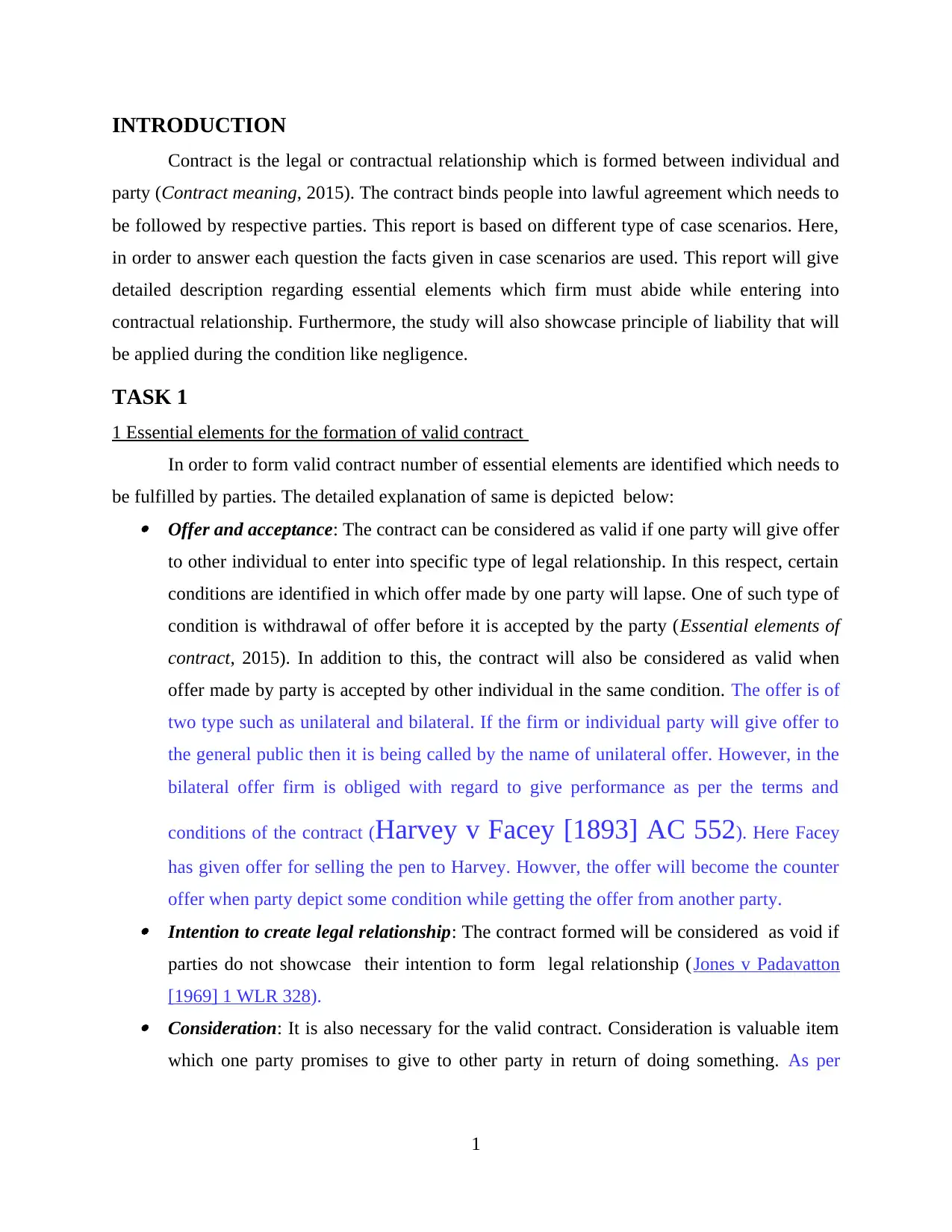
INTRODUCTION
Contract is the legal or contractual relationship which is formed between individual and
party (Contract meaning, 2015). The contract binds people into lawful agreement which needs to
be followed by respective parties. This report is based on different type of case scenarios. Here,
in order to answer each question the facts given in case scenarios are used. This report will give
detailed description regarding essential elements which firm must abide while entering into
contractual relationship. Furthermore, the study will also showcase principle of liability that will
be applied during the condition like negligence.
TASK 1
1 Essential elements for the formation of valid contract
In order to form valid contract number of essential elements are identified which needs to
be fulfilled by parties. The detailed explanation of same is depicted below: Offer and acceptance: The contract can be considered as valid if one party will give offer
to other individual to enter into specific type of legal relationship. In this respect, certain
conditions are identified in which offer made by one party will lapse. One of such type of
condition is withdrawal of offer before it is accepted by the party (Essential elements of
contract, 2015). In addition to this, the contract will also be considered as valid when
offer made by party is accepted by other individual in the same condition. The offer is of
two type such as unilateral and bilateral. If the firm or individual party will give offer to
the general public then it is being called by the name of unilateral offer. However, in the
bilateral offer firm is obliged with regard to give performance as per the terms and
conditions of the contract (Harvey v Facey [1893] AC 552). Here Facey
has given offer for selling the pen to Harvey. Howver, the offer will become the counter
offer when party depict some condition while getting the offer from another party. Intention to create legal relationship: The contract formed will be considered as void if
parties do not showcase their intention to form legal relationship (Jones v Padavatton
[1969] 1 WLR 328). Consideration: It is also necessary for the valid contract. Consideration is valuable item
which one party promises to give to other party in return of doing something. As per
1
Contract is the legal or contractual relationship which is formed between individual and
party (Contract meaning, 2015). The contract binds people into lawful agreement which needs to
be followed by respective parties. This report is based on different type of case scenarios. Here,
in order to answer each question the facts given in case scenarios are used. This report will give
detailed description regarding essential elements which firm must abide while entering into
contractual relationship. Furthermore, the study will also showcase principle of liability that will
be applied during the condition like negligence.
TASK 1
1 Essential elements for the formation of valid contract
In order to form valid contract number of essential elements are identified which needs to
be fulfilled by parties. The detailed explanation of same is depicted below: Offer and acceptance: The contract can be considered as valid if one party will give offer
to other individual to enter into specific type of legal relationship. In this respect, certain
conditions are identified in which offer made by one party will lapse. One of such type of
condition is withdrawal of offer before it is accepted by the party (Essential elements of
contract, 2015). In addition to this, the contract will also be considered as valid when
offer made by party is accepted by other individual in the same condition. The offer is of
two type such as unilateral and bilateral. If the firm or individual party will give offer to
the general public then it is being called by the name of unilateral offer. However, in the
bilateral offer firm is obliged with regard to give performance as per the terms and
conditions of the contract (Harvey v Facey [1893] AC 552). Here Facey
has given offer for selling the pen to Harvey. Howver, the offer will become the counter
offer when party depict some condition while getting the offer from another party. Intention to create legal relationship: The contract formed will be considered as void if
parties do not showcase their intention to form legal relationship (Jones v Padavatton
[1969] 1 WLR 328). Consideration: It is also necessary for the valid contract. Consideration is valuable item
which one party promises to give to other party in return of doing something. As per
1
⊘ This is a preview!⊘
Do you want full access?
Subscribe today to unlock all pages.

Trusted by 1+ million students worldwide
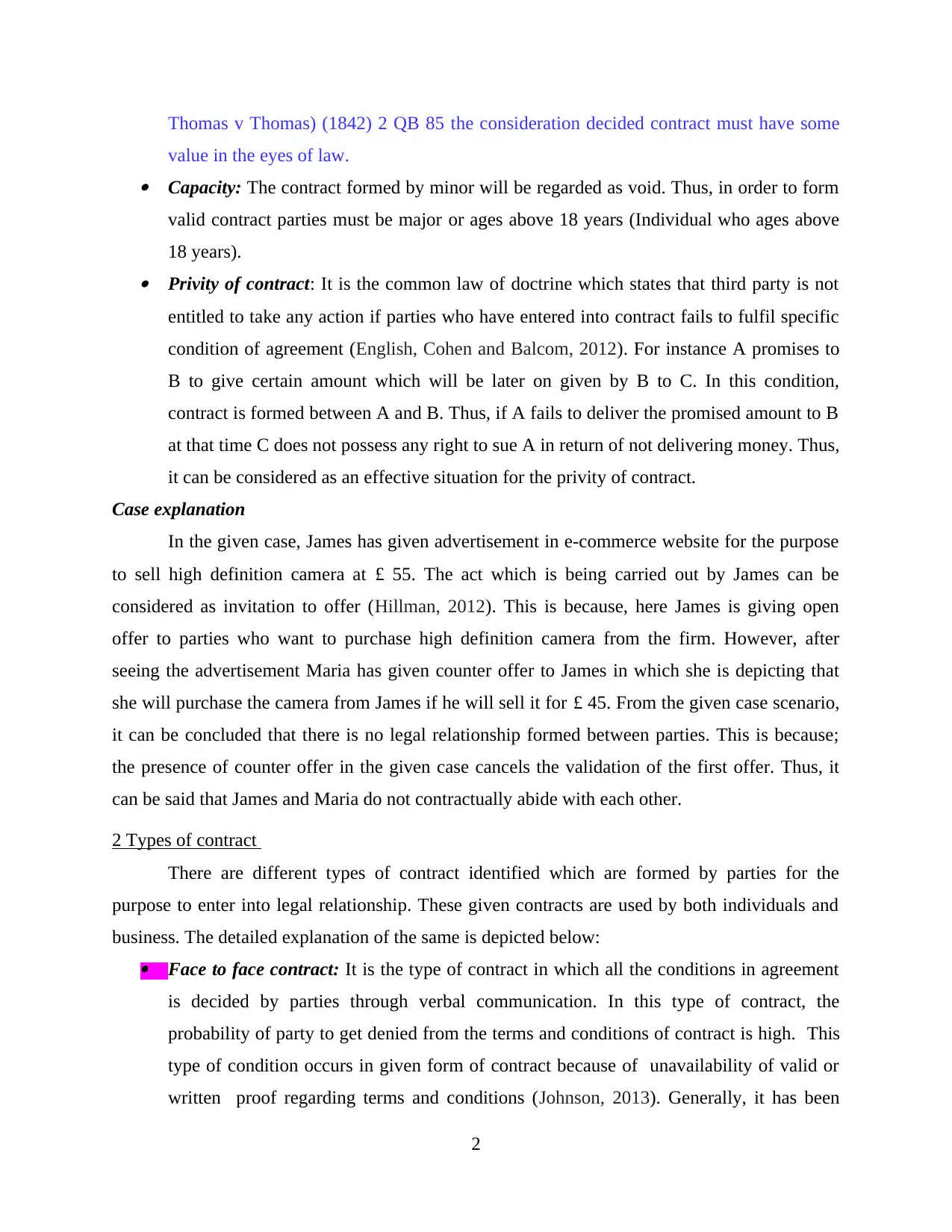
Thomas v Thomas) (1842) 2 QB 85 the consideration decided contract must have some
value in the eyes of law. Capacity: The contract formed by minor will be regarded as void. Thus, in order to form
valid contract parties must be major or ages above 18 years (Individual who ages above
18 years). Privity of contract: It is the common law of doctrine which states that third party is not
entitled to take any action if parties who have entered into contract fails to fulfil specific
condition of agreement (English, Cohen and Balcom, 2012). For instance A promises to
B to give certain amount which will be later on given by B to C. In this condition,
contract is formed between A and B. Thus, if A fails to deliver the promised amount to B
at that time C does not possess any right to sue A in return of not delivering money. Thus,
it can be considered as an effective situation for the privity of contract.
Case explanation
In the given case, James has given advertisement in e-commerce website for the purpose
to sell high definition camera at £ 55. The act which is being carried out by James can be
considered as invitation to offer (Hillman, 2012). This is because, here James is giving open
offer to parties who want to purchase high definition camera from the firm. However, after
seeing the advertisement Maria has given counter offer to James in which she is depicting that
she will purchase the camera from James if he will sell it for £ 45. From the given case scenario,
it can be concluded that there is no legal relationship formed between parties. This is because;
the presence of counter offer in the given case cancels the validation of the first offer. Thus, it
can be said that James and Maria do not contractually abide with each other.
2 Types of contract
There are different types of contract identified which are formed by parties for the
purpose to enter into legal relationship. These given contracts are used by both individuals and
business. The detailed explanation of the same is depicted below: Face to face contract: It is the type of contract in which all the conditions in agreement
is decided by parties through verbal communication. In this type of contract, the
probability of party to get denied from the terms and conditions of contract is high. This
type of condition occurs in given form of contract because of unavailability of valid or
written proof regarding terms and conditions (Johnson, 2013). Generally, it has been
2
value in the eyes of law. Capacity: The contract formed by minor will be regarded as void. Thus, in order to form
valid contract parties must be major or ages above 18 years (Individual who ages above
18 years). Privity of contract: It is the common law of doctrine which states that third party is not
entitled to take any action if parties who have entered into contract fails to fulfil specific
condition of agreement (English, Cohen and Balcom, 2012). For instance A promises to
B to give certain amount which will be later on given by B to C. In this condition,
contract is formed between A and B. Thus, if A fails to deliver the promised amount to B
at that time C does not possess any right to sue A in return of not delivering money. Thus,
it can be considered as an effective situation for the privity of contract.
Case explanation
In the given case, James has given advertisement in e-commerce website for the purpose
to sell high definition camera at £ 55. The act which is being carried out by James can be
considered as invitation to offer (Hillman, 2012). This is because, here James is giving open
offer to parties who want to purchase high definition camera from the firm. However, after
seeing the advertisement Maria has given counter offer to James in which she is depicting that
she will purchase the camera from James if he will sell it for £ 45. From the given case scenario,
it can be concluded that there is no legal relationship formed between parties. This is because;
the presence of counter offer in the given case cancels the validation of the first offer. Thus, it
can be said that James and Maria do not contractually abide with each other.
2 Types of contract
There are different types of contract identified which are formed by parties for the
purpose to enter into legal relationship. These given contracts are used by both individuals and
business. The detailed explanation of the same is depicted below: Face to face contract: It is the type of contract in which all the conditions in agreement
is decided by parties through verbal communication. In this type of contract, the
probability of party to get denied from the terms and conditions of contract is high. This
type of condition occurs in given form of contract because of unavailability of valid or
written proof regarding terms and conditions (Johnson, 2013). Generally, it has been
2
Paraphrase This Document
Need a fresh take? Get an instant paraphrase of this document with our AI Paraphraser
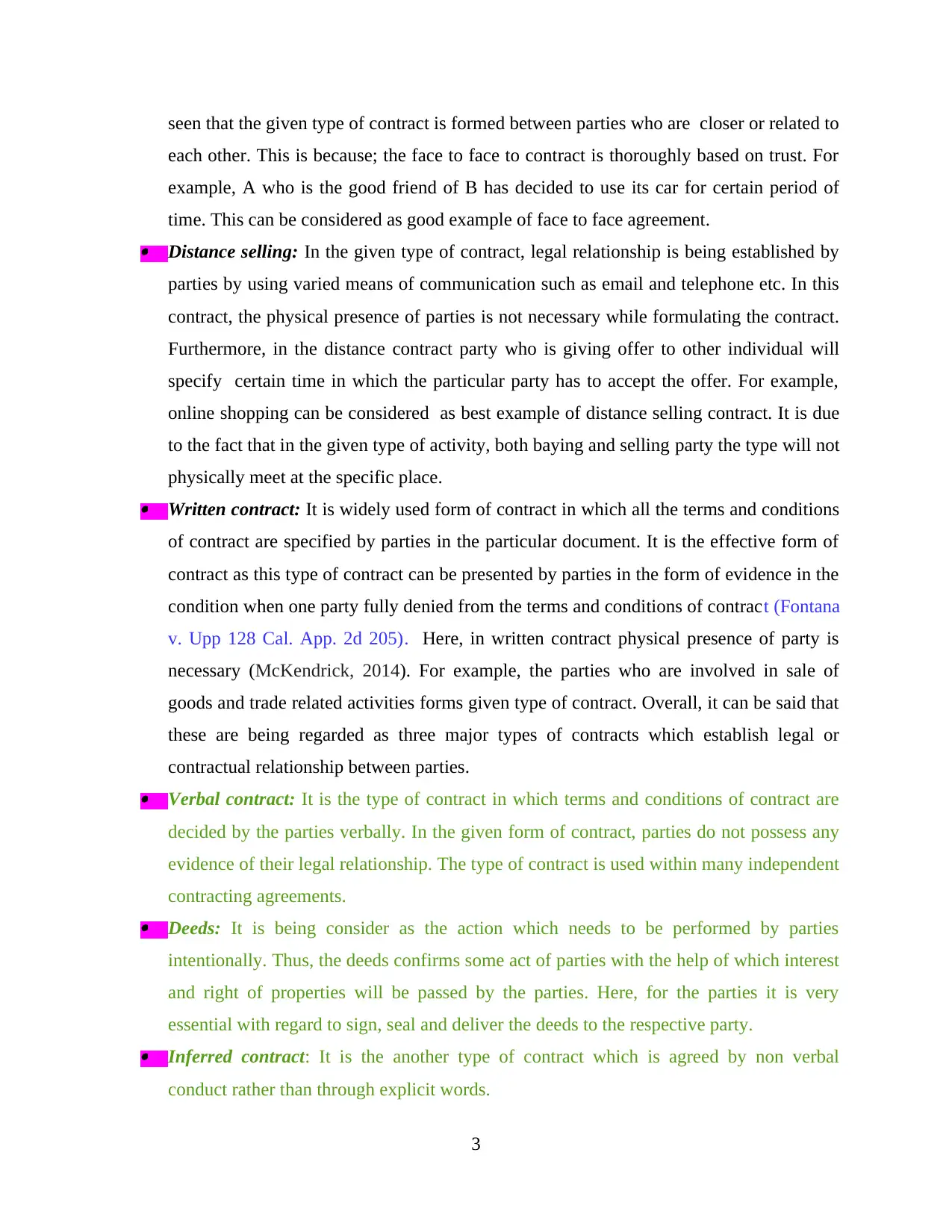
seen that the given type of contract is formed between parties who are closer or related to
each other. This is because; the face to face to contract is thoroughly based on trust. For
example, A who is the good friend of B has decided to use its car for certain period of
time. This can be considered as good example of face to face agreement. Distance selling: In the given type of contract, legal relationship is being established by
parties by using varied means of communication such as email and telephone etc. In this
contract, the physical presence of parties is not necessary while formulating the contract.
Furthermore, in the distance contract party who is giving offer to other individual will
specify certain time in which the particular party has to accept the offer. For example,
online shopping can be considered as best example of distance selling contract. It is due
to the fact that in the given type of activity, both baying and selling party the type will not
physically meet at the specific place. Written contract: It is widely used form of contract in which all the terms and conditions
of contract are specified by parties in the particular document. It is the effective form of
contract as this type of contract can be presented by parties in the form of evidence in the
condition when one party fully denied from the terms and conditions of contract (Fontana
v. Upp 128 Cal. App. 2d 205). Here, in written contract physical presence of party is
necessary (McKendrick, 2014). For example, the parties who are involved in sale of
goods and trade related activities forms given type of contract. Overall, it can be said that
these are being regarded as three major types of contracts which establish legal or
contractual relationship between parties. Verbal contract: It is the type of contract in which terms and conditions of contract are
decided by the parties verbally. In the given form of contract, parties do not possess any
evidence of their legal relationship. The type of contract is used within many independent
contracting agreements. Deeds: It is being consider as the action which needs to be performed by parties
intentionally. Thus, the deeds confirms some act of parties with the help of which interest
and right of properties will be passed by the parties. Here, for the parties it is very
essential with regard to sign, seal and deliver the deeds to the respective party. Inferred contract: It is the another type of contract which is agreed by non verbal
conduct rather than through explicit words.
3
each other. This is because; the face to face to contract is thoroughly based on trust. For
example, A who is the good friend of B has decided to use its car for certain period of
time. This can be considered as good example of face to face agreement. Distance selling: In the given type of contract, legal relationship is being established by
parties by using varied means of communication such as email and telephone etc. In this
contract, the physical presence of parties is not necessary while formulating the contract.
Furthermore, in the distance contract party who is giving offer to other individual will
specify certain time in which the particular party has to accept the offer. For example,
online shopping can be considered as best example of distance selling contract. It is due
to the fact that in the given type of activity, both baying and selling party the type will not
physically meet at the specific place. Written contract: It is widely used form of contract in which all the terms and conditions
of contract are specified by parties in the particular document. It is the effective form of
contract as this type of contract can be presented by parties in the form of evidence in the
condition when one party fully denied from the terms and conditions of contract (Fontana
v. Upp 128 Cal. App. 2d 205). Here, in written contract physical presence of party is
necessary (McKendrick, 2014). For example, the parties who are involved in sale of
goods and trade related activities forms given type of contract. Overall, it can be said that
these are being regarded as three major types of contracts which establish legal or
contractual relationship between parties. Verbal contract: It is the type of contract in which terms and conditions of contract are
decided by the parties verbally. In the given form of contract, parties do not possess any
evidence of their legal relationship. The type of contract is used within many independent
contracting agreements. Deeds: It is being consider as the action which needs to be performed by parties
intentionally. Thus, the deeds confirms some act of parties with the help of which interest
and right of properties will be passed by the parties. Here, for the parties it is very
essential with regard to sign, seal and deliver the deeds to the respective party. Inferred contract: It is the another type of contract which is agreed by non verbal
conduct rather than through explicit words.
3
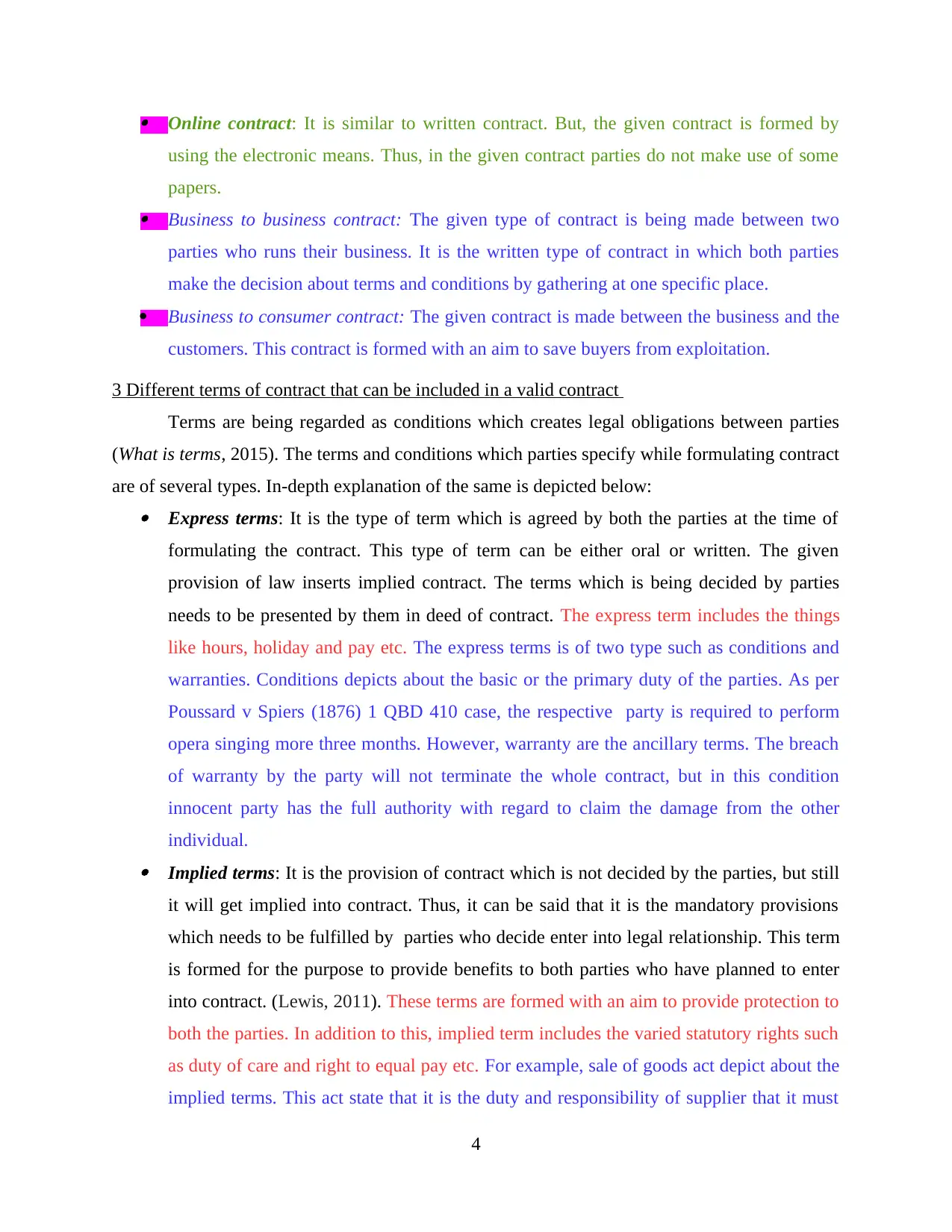
Online contract: It is similar to written contract. But, the given contract is formed by
using the electronic means. Thus, in the given contract parties do not make use of some
papers. Business to business contract: The given type of contract is being made between two
parties who runs their business. It is the written type of contract in which both parties
make the decision about terms and conditions by gathering at one specific place.
Business to consumer contract: The given contract is made between the business and the
customers. This contract is formed with an aim to save buyers from exploitation.
3 Different terms of contract that can be included in a valid contract
Terms are being regarded as conditions which creates legal obligations between parties
(What is terms, 2015). The terms and conditions which parties specify while formulating contract
are of several types. In-depth explanation of the same is depicted below: Express terms: It is the type of term which is agreed by both the parties at the time of
formulating the contract. This type of term can be either oral or written. The given
provision of law inserts implied contract. The terms which is being decided by parties
needs to be presented by them in deed of contract. The express term includes the things
like hours, holiday and pay etc. The express terms is of two type such as conditions and
warranties. Conditions depicts about the basic or the primary duty of the parties. As per
Poussard v Spiers (1876) 1 QBD 410 case, the respective party is required to perform
opera singing more three months. However, warranty are the ancillary terms. The breach
of warranty by the party will not terminate the whole contract, but in this condition
innocent party has the full authority with regard to claim the damage from the other
individual. Implied terms: It is the provision of contract which is not decided by the parties, but still
it will get implied into contract. Thus, it can be said that it is the mandatory provisions
which needs to be fulfilled by parties who decide enter into legal relationship. This term
is formed for the purpose to provide benefits to both parties who have planned to enter
into contract. (Lewis, 2011). These terms are formed with an aim to provide protection to
both the parties. In addition to this, implied term includes the varied statutory rights such
as duty of care and right to equal pay etc. For example, sale of goods act depict about the
implied terms. This act state that it is the duty and responsibility of supplier that it must
4
using the electronic means. Thus, in the given contract parties do not make use of some
papers. Business to business contract: The given type of contract is being made between two
parties who runs their business. It is the written type of contract in which both parties
make the decision about terms and conditions by gathering at one specific place.
Business to consumer contract: The given contract is made between the business and the
customers. This contract is formed with an aim to save buyers from exploitation.
3 Different terms of contract that can be included in a valid contract
Terms are being regarded as conditions which creates legal obligations between parties
(What is terms, 2015). The terms and conditions which parties specify while formulating contract
are of several types. In-depth explanation of the same is depicted below: Express terms: It is the type of term which is agreed by both the parties at the time of
formulating the contract. This type of term can be either oral or written. The given
provision of law inserts implied contract. The terms which is being decided by parties
needs to be presented by them in deed of contract. The express term includes the things
like hours, holiday and pay etc. The express terms is of two type such as conditions and
warranties. Conditions depicts about the basic or the primary duty of the parties. As per
Poussard v Spiers (1876) 1 QBD 410 case, the respective party is required to perform
opera singing more three months. However, warranty are the ancillary terms. The breach
of warranty by the party will not terminate the whole contract, but in this condition
innocent party has the full authority with regard to claim the damage from the other
individual. Implied terms: It is the provision of contract which is not decided by the parties, but still
it will get implied into contract. Thus, it can be said that it is the mandatory provisions
which needs to be fulfilled by parties who decide enter into legal relationship. This term
is formed for the purpose to provide benefits to both parties who have planned to enter
into contract. (Lewis, 2011). These terms are formed with an aim to provide protection to
both the parties. In addition to this, implied term includes the varied statutory rights such
as duty of care and right to equal pay etc. For example, sale of goods act depict about the
implied terms. This act state that it is the duty and responsibility of supplier that it must
4
⊘ This is a preview!⊘
Do you want full access?
Subscribe today to unlock all pages.

Trusted by 1+ million students worldwide
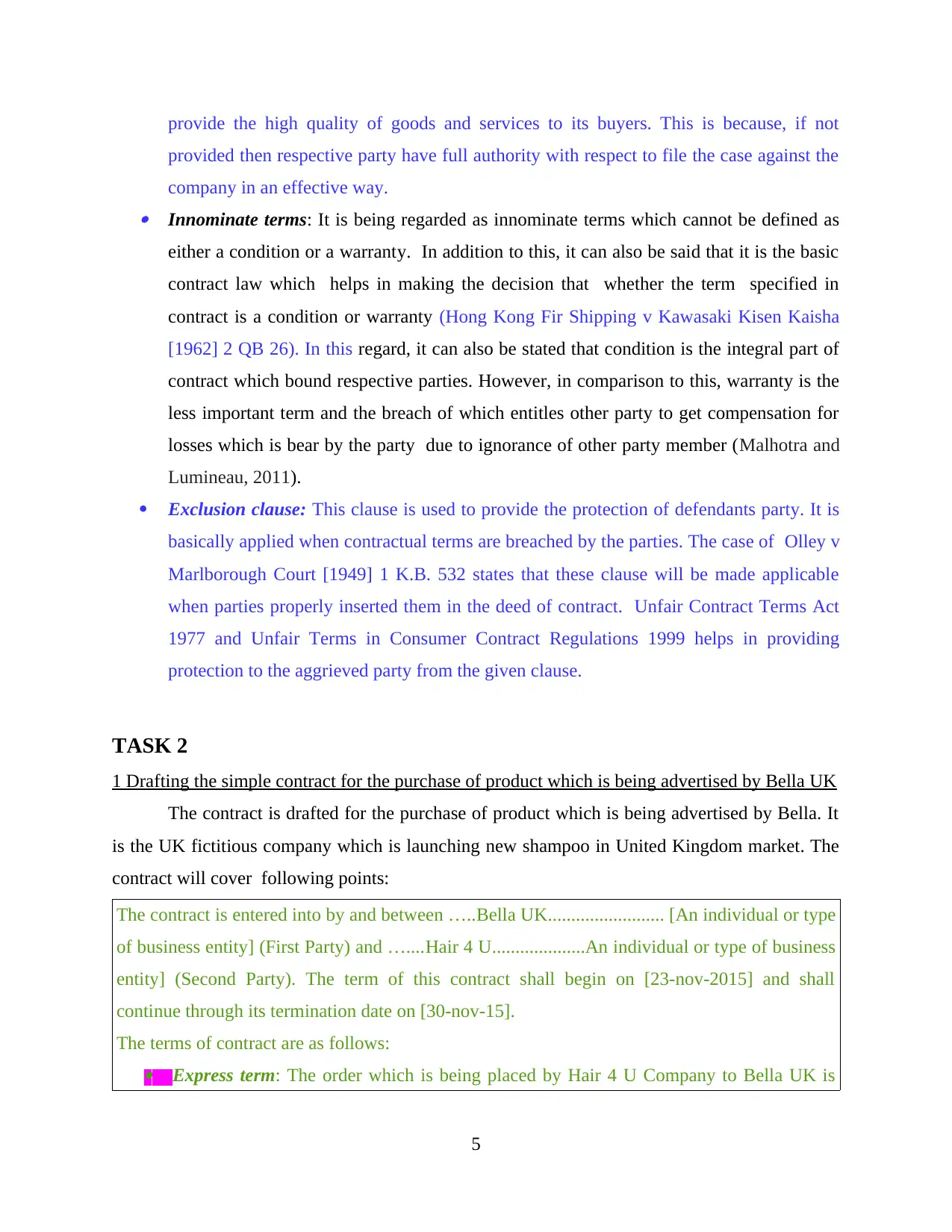
provide the high quality of goods and services to its buyers. This is because, if not
provided then respective party have full authority with respect to file the case against the
company in an effective way. Innominate terms: It is being regarded as innominate terms which cannot be defined as
either a condition or a warranty. In addition to this, it can also be said that it is the basic
contract law which helps in making the decision that whether the term specified in
contract is a condition or warranty (Hong Kong Fir Shipping v Kawasaki Kisen Kaisha
[1962] 2 QB 26). In this regard, it can also be stated that condition is the integral part of
contract which bound respective parties. However, in comparison to this, warranty is the
less important term and the breach of which entitles other party to get compensation for
losses which is bear by the party due to ignorance of other party member (Malhotra and
Lumineau, 2011).
Exclusion clause: This clause is used to provide the protection of defendants party. It is
basically applied when contractual terms are breached by the parties. The case of Olley v
Marlborough Court [1949] 1 K.B. 532 states that these clause will be made applicable
when parties properly inserted them in the deed of contract. Unfair Contract Terms Act
1977 and Unfair Terms in Consumer Contract Regulations 1999 helps in providing
protection to the aggrieved party from the given clause.
TASK 2
1 Drafting the simple contract for the purchase of product which is being advertised by Bella UK
The contract is drafted for the purchase of product which is being advertised by Bella. It
is the UK fictitious company which is launching new shampoo in United Kingdom market. The
contract will cover following points:
The contract is entered into by and between …..Bella UK......................... [An individual or type
of business entity] (First Party) and …....Hair 4 U....................An individual or type of business
entity] (Second Party). The term of this contract shall begin on [23-nov-2015] and shall
continue through its termination date on [30-nov-15].
The terms of contract are as follows: Express term: The order which is being placed by Hair 4 U Company to Bella UK is
5
provided then respective party have full authority with respect to file the case against the
company in an effective way. Innominate terms: It is being regarded as innominate terms which cannot be defined as
either a condition or a warranty. In addition to this, it can also be said that it is the basic
contract law which helps in making the decision that whether the term specified in
contract is a condition or warranty (Hong Kong Fir Shipping v Kawasaki Kisen Kaisha
[1962] 2 QB 26). In this regard, it can also be stated that condition is the integral part of
contract which bound respective parties. However, in comparison to this, warranty is the
less important term and the breach of which entitles other party to get compensation for
losses which is bear by the party due to ignorance of other party member (Malhotra and
Lumineau, 2011).
Exclusion clause: This clause is used to provide the protection of defendants party. It is
basically applied when contractual terms are breached by the parties. The case of Olley v
Marlborough Court [1949] 1 K.B. 532 states that these clause will be made applicable
when parties properly inserted them in the deed of contract. Unfair Contract Terms Act
1977 and Unfair Terms in Consumer Contract Regulations 1999 helps in providing
protection to the aggrieved party from the given clause.
TASK 2
1 Drafting the simple contract for the purchase of product which is being advertised by Bella UK
The contract is drafted for the purchase of product which is being advertised by Bella. It
is the UK fictitious company which is launching new shampoo in United Kingdom market. The
contract will cover following points:
The contract is entered into by and between …..Bella UK......................... [An individual or type
of business entity] (First Party) and …....Hair 4 U....................An individual or type of business
entity] (Second Party). The term of this contract shall begin on [23-nov-2015] and shall
continue through its termination date on [30-nov-15].
The terms of contract are as follows: Express term: The order which is being placed by Hair 4 U Company to Bella UK is
5
Paraphrase This Document
Need a fresh take? Get an instant paraphrase of this document with our AI Paraphraser
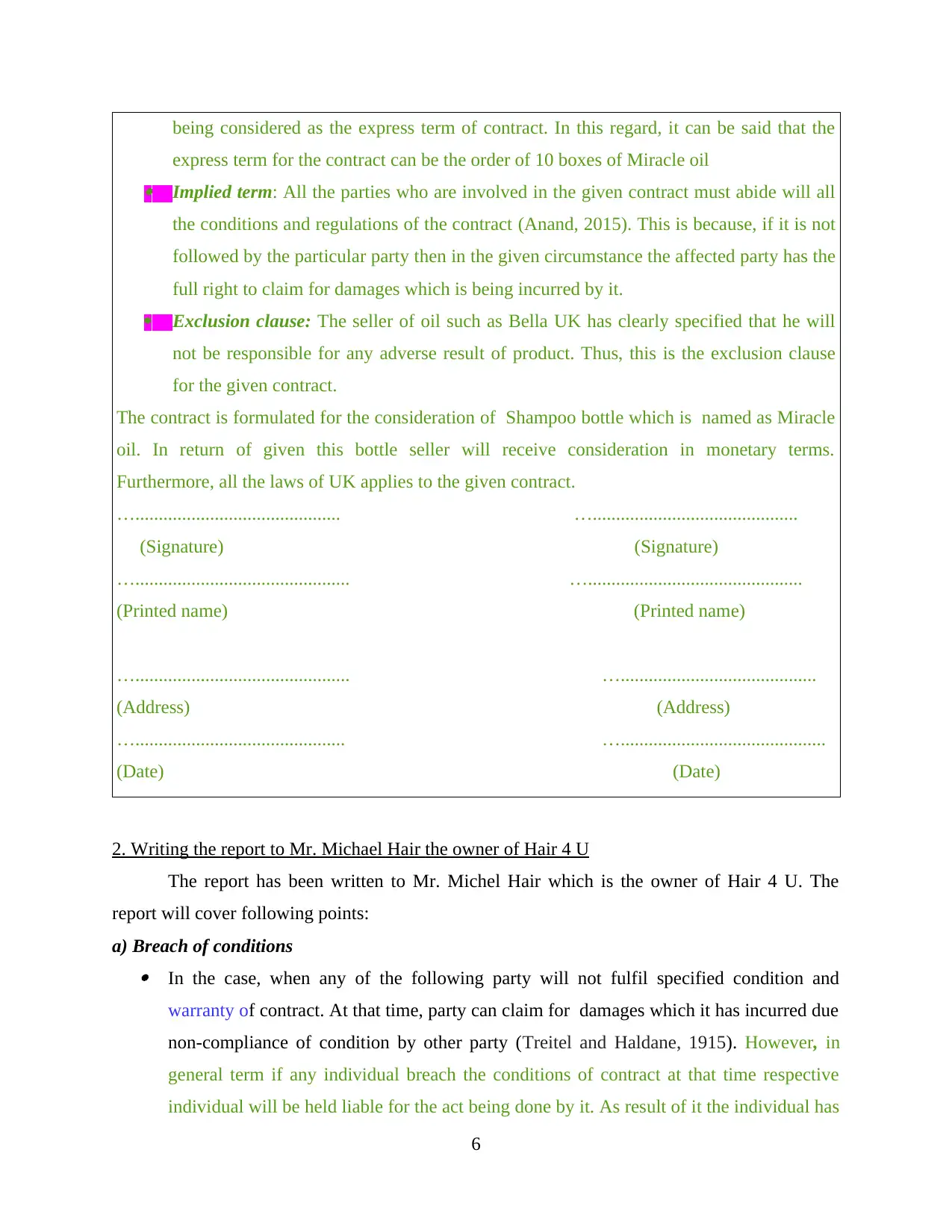
being considered as the express term of contract. In this regard, it can be said that the
express term for the contract can be the order of 10 boxes of Miracle oil Implied term: All the parties who are involved in the given contract must abide will all
the conditions and regulations of the contract (Anand, 2015). This is because, if it is not
followed by the particular party then in the given circumstance the affected party has the
full right to claim for damages which is being incurred by it.
Exclusion clause: The seller of oil such as Bella UK has clearly specified that he will
not be responsible for any adverse result of product. Thus, this is the exclusion clause
for the given contract.
The contract is formulated for the consideration of Shampoo bottle which is named as Miracle
oil. In return of given this bottle seller will receive consideration in monetary terms.
Furthermore, all the laws of UK applies to the given contract.
…............................................ …............................................
(Signature) (Signature)
….............................................. …..............................................
(Printed name) (Printed name)
….............................................. …..........................................
(Address) (Address)
…............................................. …............................................
(Date) (Date)
2. Writing the report to Mr. Michael Hair the owner of Hair 4 U
The report has been written to Mr. Michel Hair which is the owner of Hair 4 U. The
report will cover following points:
a) Breach of conditions In the case, when any of the following party will not fulfil specified condition and
warranty of contract. At that time, party can claim for damages which it has incurred due
non-compliance of condition by other party (Treitel and Haldane, 1915). However, in
general term if any individual breach the conditions of contract at that time respective
individual will be held liable for the act being done by it. As result of it the individual has
6
express term for the contract can be the order of 10 boxes of Miracle oil Implied term: All the parties who are involved in the given contract must abide will all
the conditions and regulations of the contract (Anand, 2015). This is because, if it is not
followed by the particular party then in the given circumstance the affected party has the
full right to claim for damages which is being incurred by it.
Exclusion clause: The seller of oil such as Bella UK has clearly specified that he will
not be responsible for any adverse result of product. Thus, this is the exclusion clause
for the given contract.
The contract is formulated for the consideration of Shampoo bottle which is named as Miracle
oil. In return of given this bottle seller will receive consideration in monetary terms.
Furthermore, all the laws of UK applies to the given contract.
…............................................ …............................................
(Signature) (Signature)
….............................................. …..............................................
(Printed name) (Printed name)
….............................................. …..........................................
(Address) (Address)
…............................................. …............................................
(Date) (Date)
2. Writing the report to Mr. Michael Hair the owner of Hair 4 U
The report has been written to Mr. Michel Hair which is the owner of Hair 4 U. The
report will cover following points:
a) Breach of conditions In the case, when any of the following party will not fulfil specified condition and
warranty of contract. At that time, party can claim for damages which it has incurred due
non-compliance of condition by other party (Treitel and Haldane, 1915). However, in
general term if any individual breach the conditions of contract at that time respective
individual will be held liable for the act being done by it. As result of it the individual has
6
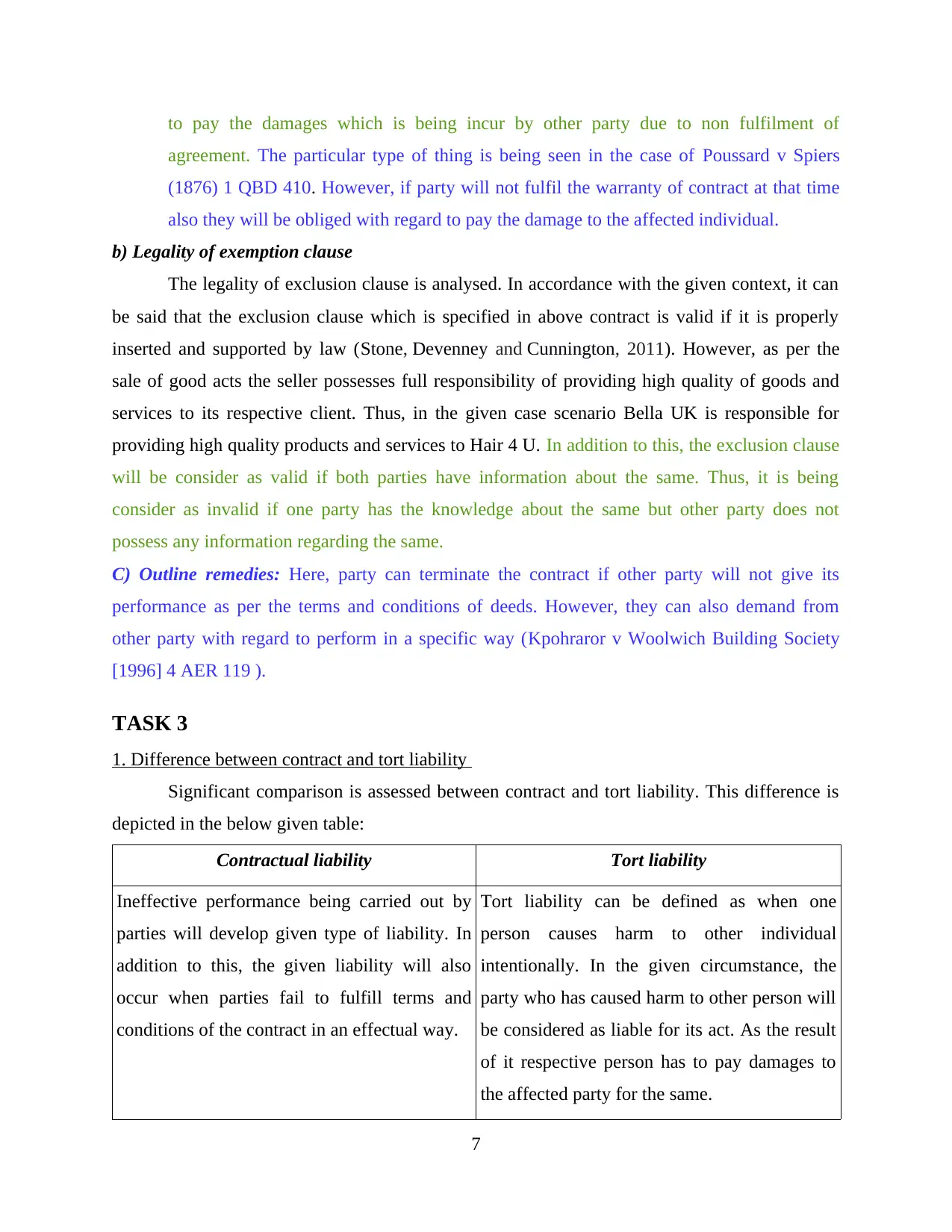
to pay the damages which is being incur by other party due to non fulfilment of
agreement. The particular type of thing is being seen in the case of Poussard v Spiers
(1876) 1 QBD 410. However, if party will not fulfil the warranty of contract at that time
also they will be obliged with regard to pay the damage to the affected individual.
b) Legality of exemption clause
The legality of exclusion clause is analysed. In accordance with the given context, it can
be said that the exclusion clause which is specified in above contract is valid if it is properly
inserted and supported by law (Stone, Devenney and Cunnington, 2011). However, as per the
sale of good acts the seller possesses full responsibility of providing high quality of goods and
services to its respective client. Thus, in the given case scenario Bella UK is responsible for
providing high quality products and services to Hair 4 U. In addition to this, the exclusion clause
will be consider as valid if both parties have information about the same. Thus, it is being
consider as invalid if one party has the knowledge about the same but other party does not
possess any information regarding the same.
C) Outline remedies: Here, party can terminate the contract if other party will not give its
performance as per the terms and conditions of deeds. However, they can also demand from
other party with regard to perform in a specific way (Kpohraror v Woolwich Building Society
[1996] 4 AER 119 ).
TASK 3
1. Difference between contract and tort liability
Significant comparison is assessed between contract and tort liability. This difference is
depicted in the below given table:
Contractual liability Tort liability
Ineffective performance being carried out by
parties will develop given type of liability. In
addition to this, the given liability will also
occur when parties fail to fulfill terms and
conditions of the contract in an effectual way.
Tort liability can be defined as when one
person causes harm to other individual
intentionally. In the given circumstance, the
party who has caused harm to other person will
be considered as liable for its act. As the result
of it respective person has to pay damages to
the affected party for the same.
7
agreement. The particular type of thing is being seen in the case of Poussard v Spiers
(1876) 1 QBD 410. However, if party will not fulfil the warranty of contract at that time
also they will be obliged with regard to pay the damage to the affected individual.
b) Legality of exemption clause
The legality of exclusion clause is analysed. In accordance with the given context, it can
be said that the exclusion clause which is specified in above contract is valid if it is properly
inserted and supported by law (Stone, Devenney and Cunnington, 2011). However, as per the
sale of good acts the seller possesses full responsibility of providing high quality of goods and
services to its respective client. Thus, in the given case scenario Bella UK is responsible for
providing high quality products and services to Hair 4 U. In addition to this, the exclusion clause
will be consider as valid if both parties have information about the same. Thus, it is being
consider as invalid if one party has the knowledge about the same but other party does not
possess any information regarding the same.
C) Outline remedies: Here, party can terminate the contract if other party will not give its
performance as per the terms and conditions of deeds. However, they can also demand from
other party with regard to perform in a specific way (Kpohraror v Woolwich Building Society
[1996] 4 AER 119 ).
TASK 3
1. Difference between contract and tort liability
Significant comparison is assessed between contract and tort liability. This difference is
depicted in the below given table:
Contractual liability Tort liability
Ineffective performance being carried out by
parties will develop given type of liability. In
addition to this, the given liability will also
occur when parties fail to fulfill terms and
conditions of the contract in an effectual way.
Tort liability can be defined as when one
person causes harm to other individual
intentionally. In the given circumstance, the
party who has caused harm to other person will
be considered as liable for its act. As the result
of it respective person has to pay damages to
the affected party for the same.
7
⊘ This is a preview!⊘
Do you want full access?
Subscribe today to unlock all pages.

Trusted by 1+ million students worldwide
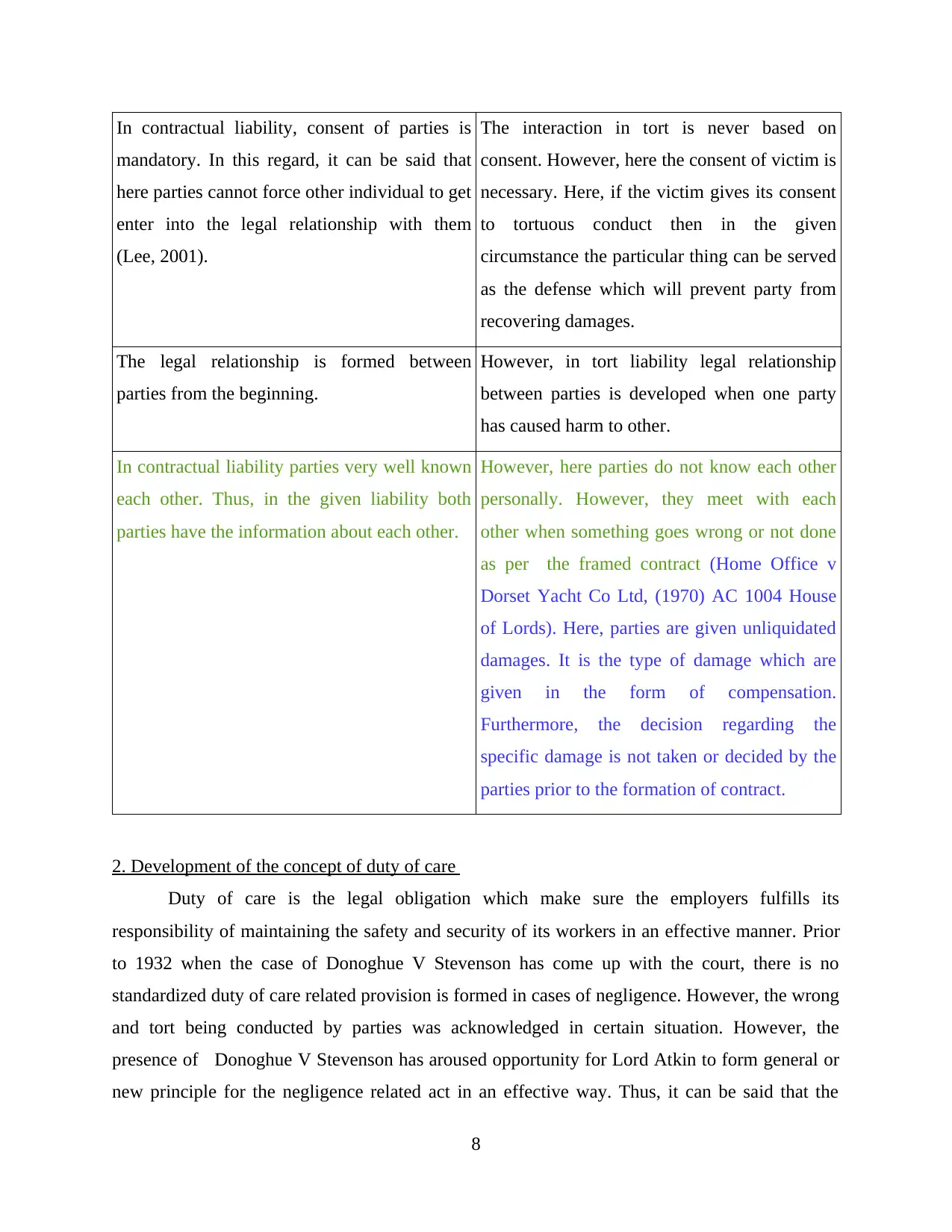
In contractual liability, consent of parties is
mandatory. In this regard, it can be said that
here parties cannot force other individual to get
enter into the legal relationship with them
(Lee, 2001).
The interaction in tort is never based on
consent. However, here the consent of victim is
necessary. Here, if the victim gives its consent
to tortuous conduct then in the given
circumstance the particular thing can be served
as the defense which will prevent party from
recovering damages.
The legal relationship is formed between
parties from the beginning.
However, in tort liability legal relationship
between parties is developed when one party
has caused harm to other.
In contractual liability parties very well known
each other. Thus, in the given liability both
parties have the information about each other.
However, here parties do not know each other
personally. However, they meet with each
other when something goes wrong or not done
as per the framed contract (Home Office v
Dorset Yacht Co Ltd, (1970) AC 1004 House
of Lords). Here, parties are given unliquidated
damages. It is the type of damage which are
given in the form of compensation.
Furthermore, the decision regarding the
specific damage is not taken or decided by the
parties prior to the formation of contract.
2. Development of the concept of duty of care
Duty of care is the legal obligation which make sure the employers fulfills its
responsibility of maintaining the safety and security of its workers in an effective manner. Prior
to 1932 when the case of Donoghue V Stevenson has come up with the court, there is no
standardized duty of care related provision is formed in cases of negligence. However, the wrong
and tort being conducted by parties was acknowledged in certain situation. However, the
presence of Donoghue V Stevenson has aroused opportunity for Lord Atkin to form general or
new principle for the negligence related act in an effective way. Thus, it can be said that the
8
mandatory. In this regard, it can be said that
here parties cannot force other individual to get
enter into the legal relationship with them
(Lee, 2001).
The interaction in tort is never based on
consent. However, here the consent of victim is
necessary. Here, if the victim gives its consent
to tortuous conduct then in the given
circumstance the particular thing can be served
as the defense which will prevent party from
recovering damages.
The legal relationship is formed between
parties from the beginning.
However, in tort liability legal relationship
between parties is developed when one party
has caused harm to other.
In contractual liability parties very well known
each other. Thus, in the given liability both
parties have the information about each other.
However, here parties do not know each other
personally. However, they meet with each
other when something goes wrong or not done
as per the framed contract (Home Office v
Dorset Yacht Co Ltd, (1970) AC 1004 House
of Lords). Here, parties are given unliquidated
damages. It is the type of damage which are
given in the form of compensation.
Furthermore, the decision regarding the
specific damage is not taken or decided by the
parties prior to the formation of contract.
2. Development of the concept of duty of care
Duty of care is the legal obligation which make sure the employers fulfills its
responsibility of maintaining the safety and security of its workers in an effective manner. Prior
to 1932 when the case of Donoghue V Stevenson has come up with the court, there is no
standardized duty of care related provision is formed in cases of negligence. However, the wrong
and tort being conducted by parties was acknowledged in certain situation. However, the
presence of Donoghue V Stevenson has aroused opportunity for Lord Atkin to form general or
new principle for the negligence related act in an effective way. Thus, it can be said that the
8
Paraphrase This Document
Need a fresh take? Get an instant paraphrase of this document with our AI Paraphraser
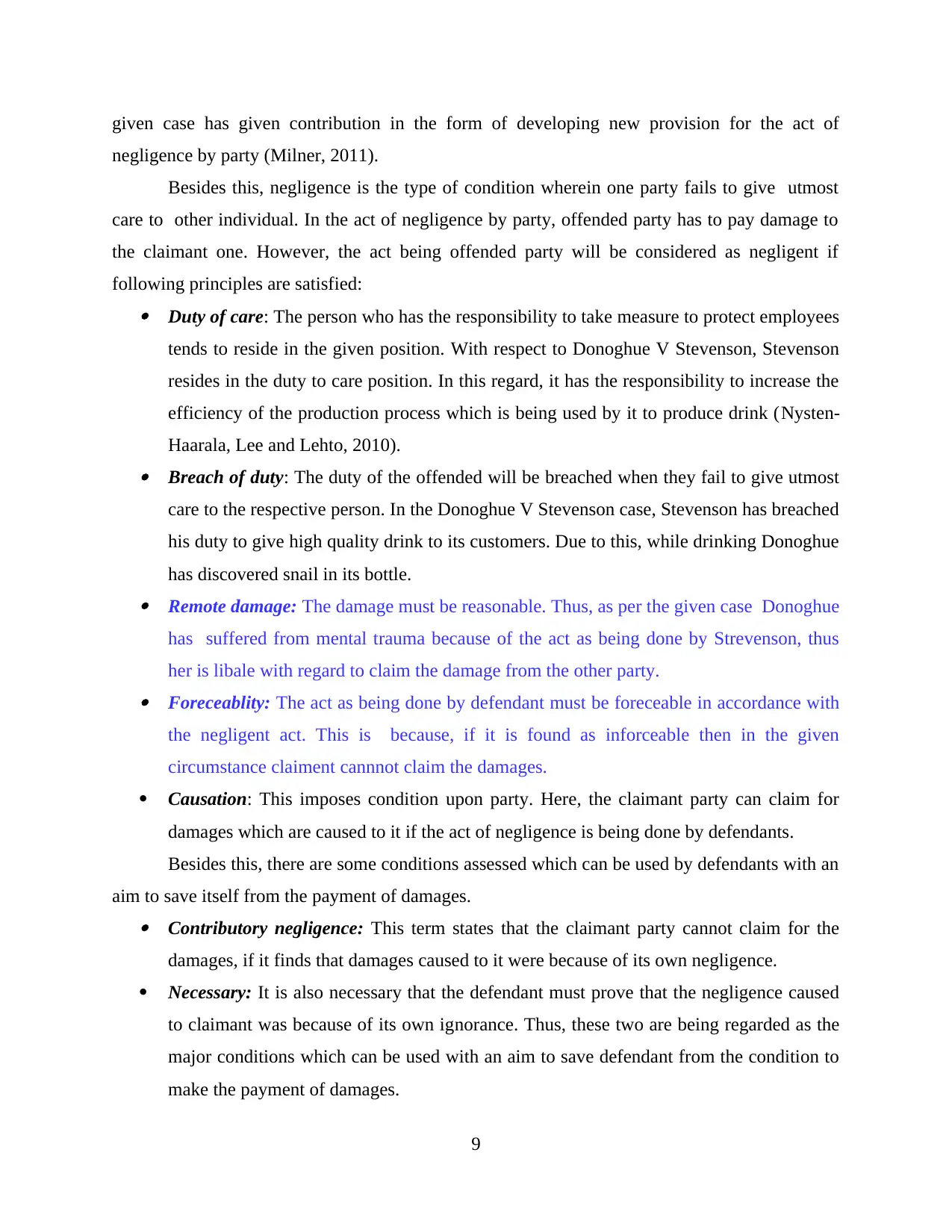
given case has given contribution in the form of developing new provision for the act of
negligence by party (Milner, 2011).
Besides this, negligence is the type of condition wherein one party fails to give utmost
care to other individual. In the act of negligence by party, offended party has to pay damage to
the claimant one. However, the act being offended party will be considered as negligent if
following principles are satisfied: Duty of care: The person who has the responsibility to take measure to protect employees
tends to reside in the given position. With respect to Donoghue V Stevenson, Stevenson
resides in the duty to care position. In this regard, it has the responsibility to increase the
efficiency of the production process which is being used by it to produce drink (Nysten-
Haarala, Lee and Lehto, 2010). Breach of duty: The duty of the offended will be breached when they fail to give utmost
care to the respective person. In the Donoghue V Stevenson case, Stevenson has breached
his duty to give high quality drink to its customers. Due to this, while drinking Donoghue
has discovered snail in its bottle. Remote damage: The damage must be reasonable. Thus, as per the given case Donoghue
has suffered from mental trauma because of the act as being done by Strevenson, thus
her is libale with regard to claim the damage from the other party. Foreceablity: The act as being done by defendant must be foreceable in accordance with
the negligent act. This is because, if it is found as inforceable then in the given
circumstance claiment cannnot claim the damages.
Causation: This imposes condition upon party. Here, the claimant party can claim for
damages which are caused to it if the act of negligence is being done by defendants.
Besides this, there are some conditions assessed which can be used by defendants with an
aim to save itself from the payment of damages. Contributory negligence: This term states that the claimant party cannot claim for the
damages, if it finds that damages caused to it were because of its own negligence.
Necessary: It is also necessary that the defendant must prove that the negligence caused
to claimant was because of its own ignorance. Thus, these two are being regarded as the
major conditions which can be used with an aim to save defendant from the condition to
make the payment of damages.
9
negligence by party (Milner, 2011).
Besides this, negligence is the type of condition wherein one party fails to give utmost
care to other individual. In the act of negligence by party, offended party has to pay damage to
the claimant one. However, the act being offended party will be considered as negligent if
following principles are satisfied: Duty of care: The person who has the responsibility to take measure to protect employees
tends to reside in the given position. With respect to Donoghue V Stevenson, Stevenson
resides in the duty to care position. In this regard, it has the responsibility to increase the
efficiency of the production process which is being used by it to produce drink (Nysten-
Haarala, Lee and Lehto, 2010). Breach of duty: The duty of the offended will be breached when they fail to give utmost
care to the respective person. In the Donoghue V Stevenson case, Stevenson has breached
his duty to give high quality drink to its customers. Due to this, while drinking Donoghue
has discovered snail in its bottle. Remote damage: The damage must be reasonable. Thus, as per the given case Donoghue
has suffered from mental trauma because of the act as being done by Strevenson, thus
her is libale with regard to claim the damage from the other party. Foreceablity: The act as being done by defendant must be foreceable in accordance with
the negligent act. This is because, if it is found as inforceable then in the given
circumstance claiment cannnot claim the damages.
Causation: This imposes condition upon party. Here, the claimant party can claim for
damages which are caused to it if the act of negligence is being done by defendants.
Besides this, there are some conditions assessed which can be used by defendants with an
aim to save itself from the payment of damages. Contributory negligence: This term states that the claimant party cannot claim for the
damages, if it finds that damages caused to it were because of its own negligence.
Necessary: It is also necessary that the defendant must prove that the negligence caused
to claimant was because of its own ignorance. Thus, these two are being regarded as the
major conditions which can be used with an aim to save defendant from the condition to
make the payment of damages.
9
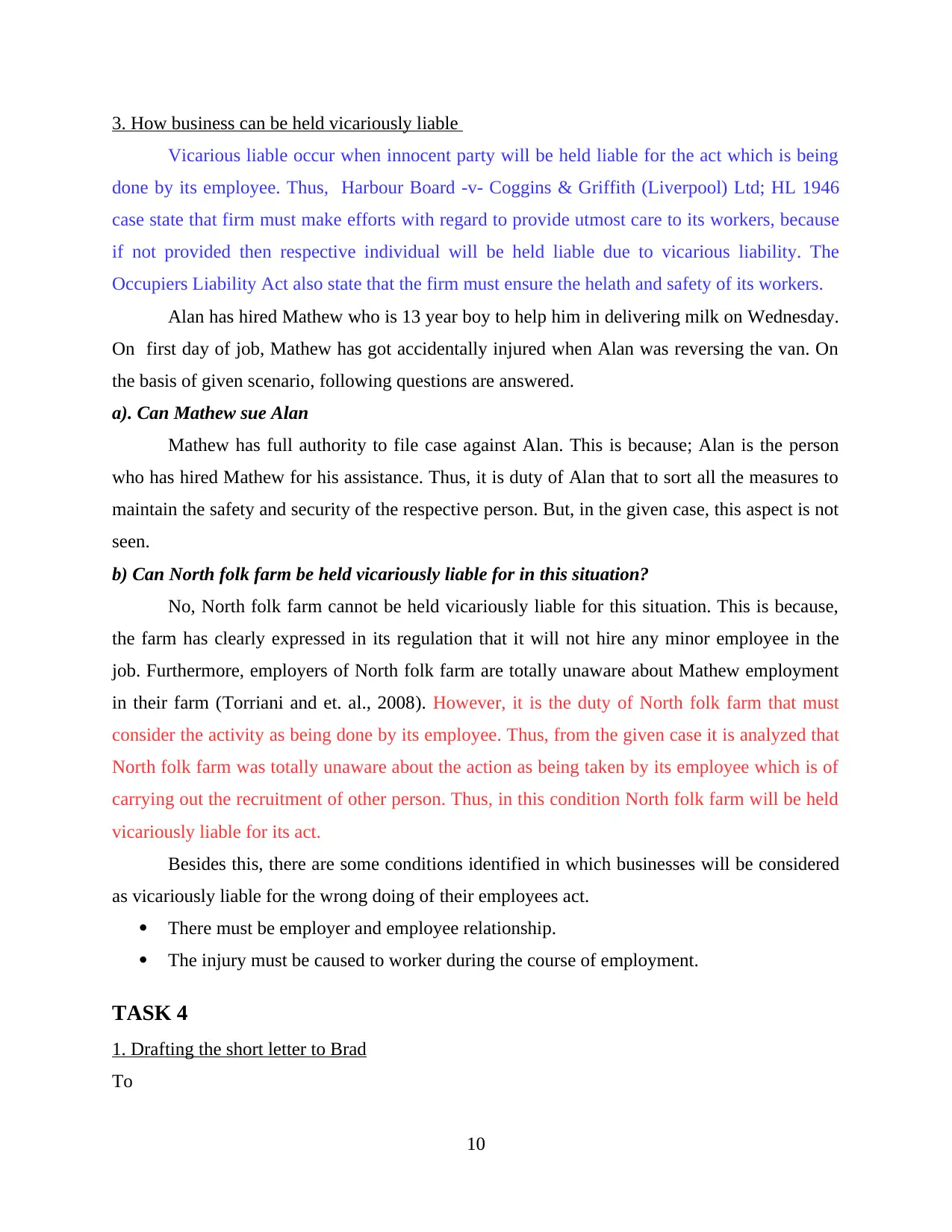
3. How business can be held vicariously liable
Vicarious liable occur when innocent party will be held liable for the act which is being
done by its employee. Thus, Harbour Board -v- Coggins & Griffith (Liverpool) Ltd; HL 1946
case state that firm must make efforts with regard to provide utmost care to its workers, because
if not provided then respective individual will be held liable due to vicarious liability. The
Occupiers Liability Act also state that the firm must ensure the helath and safety of its workers.
Alan has hired Mathew who is 13 year boy to help him in delivering milk on Wednesday.
On first day of job, Mathew has got accidentally injured when Alan was reversing the van. On
the basis of given scenario, following questions are answered.
a). Can Mathew sue Alan
Mathew has full authority to file case against Alan. This is because; Alan is the person
who has hired Mathew for his assistance. Thus, it is duty of Alan that to sort all the measures to
maintain the safety and security of the respective person. But, in the given case, this aspect is not
seen.
b) Can North folk farm be held vicariously liable for in this situation?
No, North folk farm cannot be held vicariously liable for this situation. This is because,
the farm has clearly expressed in its regulation that it will not hire any minor employee in the
job. Furthermore, employers of North folk farm are totally unaware about Mathew employment
in their farm (Torriani and et. al., 2008). However, it is the duty of North folk farm that must
consider the activity as being done by its employee. Thus, from the given case it is analyzed that
North folk farm was totally unaware about the action as being taken by its employee which is of
carrying out the recruitment of other person. Thus, in this condition North folk farm will be held
vicariously liable for its act.
Besides this, there are some conditions identified in which businesses will be considered
as vicariously liable for the wrong doing of their employees act.
There must be employer and employee relationship.
The injury must be caused to worker during the course of employment.
TASK 4
1. Drafting the short letter to Brad
To
10
Vicarious liable occur when innocent party will be held liable for the act which is being
done by its employee. Thus, Harbour Board -v- Coggins & Griffith (Liverpool) Ltd; HL 1946
case state that firm must make efforts with regard to provide utmost care to its workers, because
if not provided then respective individual will be held liable due to vicarious liability. The
Occupiers Liability Act also state that the firm must ensure the helath and safety of its workers.
Alan has hired Mathew who is 13 year boy to help him in delivering milk on Wednesday.
On first day of job, Mathew has got accidentally injured when Alan was reversing the van. On
the basis of given scenario, following questions are answered.
a). Can Mathew sue Alan
Mathew has full authority to file case against Alan. This is because; Alan is the person
who has hired Mathew for his assistance. Thus, it is duty of Alan that to sort all the measures to
maintain the safety and security of the respective person. But, in the given case, this aspect is not
seen.
b) Can North folk farm be held vicariously liable for in this situation?
No, North folk farm cannot be held vicariously liable for this situation. This is because,
the farm has clearly expressed in its regulation that it will not hire any minor employee in the
job. Furthermore, employers of North folk farm are totally unaware about Mathew employment
in their farm (Torriani and et. al., 2008). However, it is the duty of North folk farm that must
consider the activity as being done by its employee. Thus, from the given case it is analyzed that
North folk farm was totally unaware about the action as being taken by its employee which is of
carrying out the recruitment of other person. Thus, in this condition North folk farm will be held
vicariously liable for its act.
Besides this, there are some conditions identified in which businesses will be considered
as vicariously liable for the wrong doing of their employees act.
There must be employer and employee relationship.
The injury must be caused to worker during the course of employment.
TASK 4
1. Drafting the short letter to Brad
To
10
⊘ This is a preview!⊘
Do you want full access?
Subscribe today to unlock all pages.

Trusted by 1+ million students worldwide
1 out of 16
Related Documents
Your All-in-One AI-Powered Toolkit for Academic Success.
+13062052269
info@desklib.com
Available 24*7 on WhatsApp / Email
![[object Object]](/_next/static/media/star-bottom.7253800d.svg)
Unlock your academic potential
Copyright © 2020–2026 A2Z Services. All Rights Reserved. Developed and managed by ZUCOL.

![Analysis of Contract and Tort Law in Business Context - [Module Name]](/_next/image/?url=https%3A%2F%2Fdesklib.com%2Fmedia%2Fimages%2Fb4a2ce2d00e84688b846acd1edfd5492.jpg&w=256&q=75)



